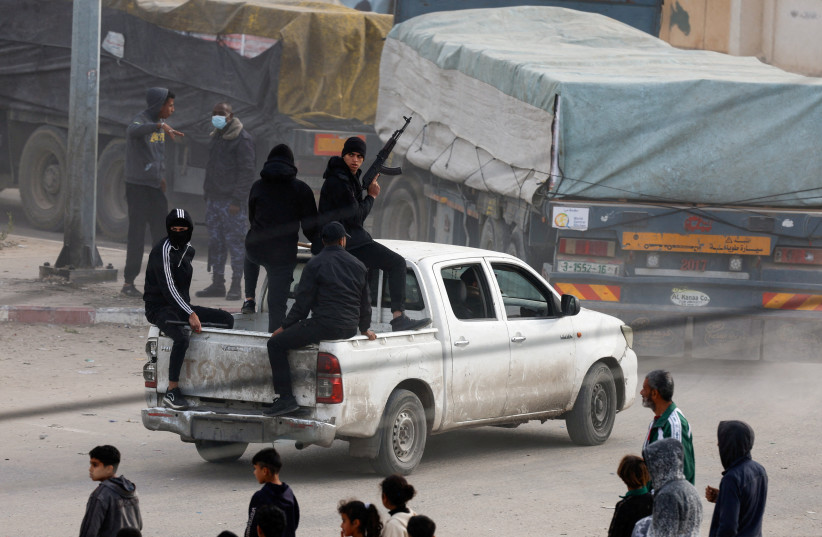Head of the Mossad, David Barnea, left for Doha on Sunday for the ongoing hostage negotiations and counter-proposal to the deal presented by Hamas with Qatari and Egyptian officials.
Additionally, the war and political-security cabinets met recently to determine the policy regarding the continuation of negotiations and the limits mandated by the negotiation team in Qatar.
Following the discussions about the hostage deal, Micah Kobi, a former senior Shin Bet investigator who interrogated Hamas chief Yahya Sinwar for over 150 hours when he was in an Israeli prison, cast great doubt on the possibility of reaching a deal with Hamas.
Kobi, in a conversation with Maariv, said that Sinwar's goal is to "delay the deal as much as possible in order to lead to a situation of filth and disease in the Gaza Strip - which will ultimately cause the world to pressure Israel to stop its war."
Hamas - and Sinwar's - way of thinking
Kobi told Maariv, "I think in Israel, we still do not fully understand Hamas's way of thinking - and Sinwar's in particular. So far, the IDF has eliminated close to half of Hamas terrorists, but this will not prevent Sinwar from reinvigorating the organization in the future. His goal is to recruit more Gazans to Hamas, rebuild infrastructure - and plan another October 7."
"Sinwar draws his hatred for Jews from Ahmed Yassin, who founded Hamas, and the idea that the Palestinians' jihad is to destroy the Jews and Islamify all of the Middle East, and therefore the hatred towards us is intense," he described.

"Without generalizing the families of the abductees whose actions we have to contain in any situation, as soon as Hamas sees the division in Israel and demonstrations against the government - Hamas rejoices."
"There are those using the demonstrations as incitement, and I believe that this is not the right time to express opposition since it causes Hamas to harden its positions regarding the deal. The confrontations and arguments are unnecessary at this time. In my opinion, nothing came of the talks," he said.
Military pressure on Hamas
Regarding the first hostage deal that materialized last November, Kobi says that "Hamas agreed to its terms only due to the fact that the IDF was exerting heavy military pressure in the Strip - and therefore, it urgently needed a truce. In addition, the organization had difficulty controlling the abductees who were held in many different locations in the Gaza Strip."
Kobi further emphasizes that there are clauses that Israel cannot compromise on during the negotiations with Hamas: "Israel cannot pay the price of releasing so many prisoners with blood on their hands. There are criminal terrorists, terrorists without blood on their hands which could be released - Hamas wants to release the terrorists, including the Nukhba terrorists who murdered, burned, and raped Israelis on October 7."
Taking control of Rafah
"If this were to happen, how do you look at the families of the massacre victims in the eyes? What will we tell them then? What will we say to the Gaza border residents after they are released from captivity? After all, we all know that the day after the terrorists are released - they will become terrorist operatives again. There will be nothing to prevent them from doing so."
"Beyond this, IDF forces must remain in the Gaza Strip until they destroy all of Hamas' military capabilities - until they take control of Rafah, where I estimate there are still around 10,000 terrorists."
"We must eliminate all surviving terrorists and all terrorist infrastructure - to complete the mission of the soldiers who fell during the ground operations, who were working to destroy Hamas."
Beyond that, Kobi further maintains that one should not agree to any clause in the negotiations that would lead to the return of the Palestinians to the northern Gaza Strip.
"After the IDF's activity in recent months, the areas in the northern Gaza Strip are currently being swept. As soon as the Palestinian residents return to them, including, of course, Hamas terrorists who are well assimilated into the population - it will be very easy for them to reconnect and organize terrorist operations, improve existing infrastructure, find and build weapons - and return to launching rockets and hitting Israel from the north of the Strip. This is a guerrilla war in a densely populated area - where we cannot pay any price - because it will be much heavier than we have already paid."
